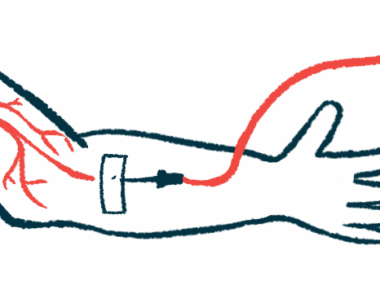Most GENEr8-1 trial patients bleed-free 4 years after Roctavian
Gene therapy was approved for hemophilia A in the US nearly a year ago
Written by |
More than half the adults with hemophilia A in the Phase 3 GENEr8-1 clinical trial remain completely free of bleeds needing treatment, four years after a single dose of the gene therapy Roctavian (valoctocogene roxaparvovec-rvox).
Also, activity levels of factor VIII (FVIII), the faulty clotting protein in hemophilia A, were generally stable between the third and fourth year after dosing for most patients, even without preventive factor replacement treatment, or, prophylaxis.
That’s according to new trial data announced by the therapy’s developer BioMarin Pharmaceutical. The results will be presented at the 32nd Congress of the International Society on Thrombosis and Haemostasis (ISTH) this month in Bangkok.
“We are pleased to share data at ISTH demonstrating that Roctavian continues to offer durable and sustained bleed control and … factor VIII [production] four years after the infusion, representing the longest and largest Phase 3 follow-up results of a gene therapy in hemophilia,” Hank Fuchs, MD, president of worldwide research and development at BioMarin, said in a company press release. “Importantly, these Phase 3 data also indicate a plateauing of factor VIII levels after year three with the majority of patients remaining off prophylaxis, which shows Roctavian can offer long-term bleed protection for adults with severe hemophilia A and may provide relief from the burden of chronic infusions and injections.”
Hemophilia A is caused by FVIII deficiency and conventional replacement therapies for this form of hemophilia administer a working version of the FVIII protein into a patient’s bloodstream. Roctavian is designed to deliver a healthy copy of the gene that encodes FVIII to cells in the liver, letting the body produce a working FVIII. This should prevent bleeds and minimize needing replacement therapies.
The gene therapy was approved in the U.S. nearly a year ago. The approval was supported largely by three-year data from the Phase 3 GENEr8-1 trial (NCT03370913), which tested Roctavian in 134 men with severe hemophilia A who were on standard prophylaxis to prevent bleeds.
Most patients were bleed-free, without the need for replacement therapies, three years after dosing, results showed.
Four years of Roctavian treatment
The new data reflect four-year findings from the 112 patients who completed at least six months of pre-Roctavian monitoring while on prophylaxis. In the four years since Roctavian was administered, more than half (54.5%) have been completely free from bleeds that require treatment.
All but two are still in the study in its fourth year and 81 (73.6%) were free from bleeds needing treatment, while 61.8% were free from all bleeding. Only 24 of the 134 enrolled patients (17.9%) have resumed prophylaxis with either lab-made FVIII or Hemlibra (emicizumab) “without any complications,” BioMarin stated.
Information on the 130 patients with available FVIII data at the end of year four showed that average FVIII activity ranged from 16.1 to 27.1 international units per deciliter (IU/dL), depending on the measurement method used. These FVIII activity levels, which indicate mild hemophilia, were largely similar to values seen at year three. Before treatment, all the patients had severe disease, defined as FVIII activity of less than 1 IU/dL.
Over four years, the 112 patients had a mean 1.3 bleeds a year. On year four, the 110 patients had a mean 1.2 bleeds and a median of 0 bleeds, meaning most didn’t have any bleeds.
The gene therapy also improved scores on the Haemo-QOL-A, a standardized measure that assesses health-related quality of life in people with hemophilia. It covers seven domains, and total scores range from 0 to 30, with higher scores indicating better quality of life.
After four years, the Haemo-QOL-A total score increased by 6.2 points, with gains reported in physical functioning, role functioning, and consequences of bleeding. Total score increases greater than 5.7 points from the start of the study were observed regardless of the patients’ FVIII activity at year four.
“People living with severe hemophilia A often experience burdens associated with lifelong treatment, such as the need for frequent infusions or injections, as well as health complications associated with bleeds,” said Flora Peyvandi, MD, PhD, who was involved in these analyses, and is the president of the ISTH. “These data demonstrate the meaningful, positive impact that Roctavian treatment can have on patients’ quality of life, especially in helping them move more freely and reducing the burden of caring for bleeding episodes.”
BioMarin will discuss seven-year data from an earlier Roctavian Phase 1/2 trial (NCT02576795) at the ISTH congress. The data were recently presented at a congress in Europe and showed a significant, sustained drop in bleeding rates.



